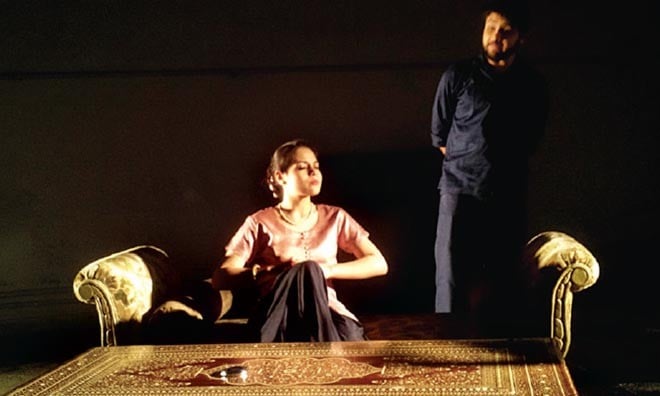
Although short of a social satire, a recurrent theme in Manto’s writings, Kamra # 9 proved to be a well acquitted adaptation

A theatrical adaptation of Kamra # 9, originally a radio play by legendary Urdu short story writer Saadat Hassan Manto, was bound to raise expectations.
Entering Alhamra on The Mall, one witnessed a full house with attendees eager to see how Manto’s work would be delivered this time. Directed by Azeem Hamid, a student of Visual Communication Design at BNU, the play centred around Shirin and Zamaan and their intrigue regarding the new occupant of "kamra number nau" in Krishan building.
Shireen is brought to life by the gifted Zoya Uzair who is perpetually bored of her continually approaching suitors, namely a well respected Nasir (Faizan Naveed) who she writes off as being unoriginal and lacking a certain charm. Such boredom leads to an active inquisition into who exactly the mysterious inhabitant residing the room a few doors down is.
Speaking exclusively to TNS, after the curtain call, Azeem Hamid expressed his desire to revive Urdu literature on theatre. "I chose this play specifically because everywhere around the world to deliver workshops or lectures regarding theatre, they always talk about the importance of literature.
"We wanted to do something different from the slew of slapstick plays happening every now and then."
Zoya Uzair echoed this statement: "It was an honour doing Manto sir’s play, especially since we don’t usually get to do theatre which has roots in Urdu literature."
The acting, noticeably Uzair’s, was the hallmark of the performance. Her precise comic timing alongside the much appreciated Namwar Ayaz (as Zamaan) received thunderous applause from the audience.
The actors also eagerly spoke of their much-awaited performance due in India.
The live music by Moeen Ahmad and Rehmat Ali contributed greatly to the high points of the play, being a distinct feature of the 60-minute production.
The lighting, a myriad of colours and silhouettes credited to Shakeel Siddique, recreated the atmosphere of 1930s’ Delhi.
The strengths of the show ultimately lay in the subtle amalgamation of all aspects: an evocative score, an effective production and lighting techniques and laudable acting.
The halls of Alhamra resounded with laughter at Manto’s buoyant humour and wit.
The only evident flaw in an otherwise commendable performance was the confusion surrounding the final few minutes of the play. The ending seemed hasty and not as fully drawn out as it should have been -- as the point in time where all preceding mystery was to be collocated, this moment left many dissatisfied.
Although not quite satirical in nature, a prevalent element in Manto’s writings, Kamra # 9 provided insight into human complexities.